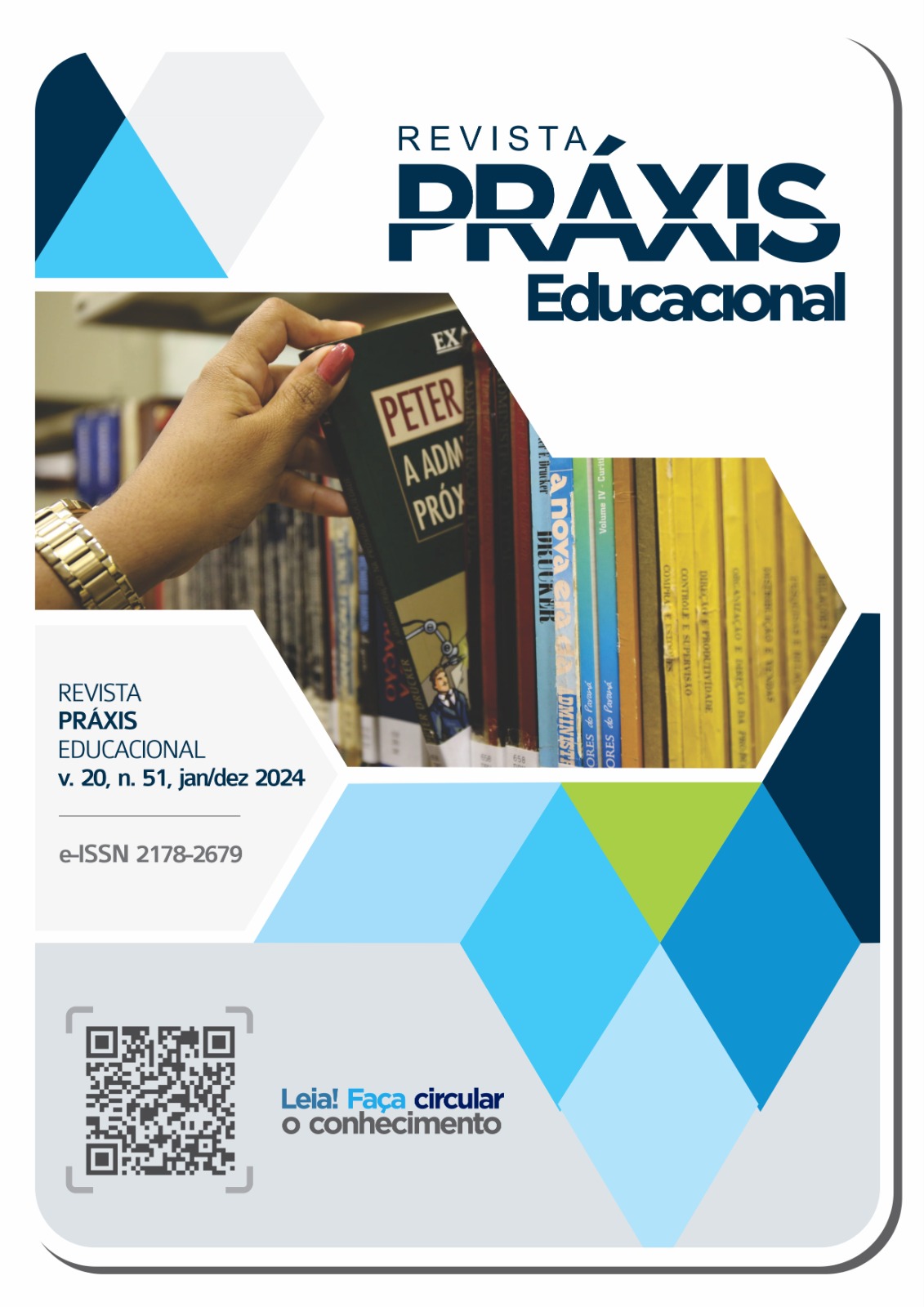Considerations on gender and sexuality issues associated with tv advertisements in the school context
DOI:
https://doi.org/10.22481/praxisedu.v20i51.12889Keywords:
gender, sexuality, tv advertisementsAbstract
The aim of the current study is to investigate the viewpoint of 9th-grade Elementary School male/female students about gender and sexuality issues presented in TV advertisements. The adopted methodology has followed a qualitative approach, based on collaborative interventionist fieldwork. Data generation instruments comprised participatory observation, conversation circle, thematic workshop and questionnaires. In total, 25 students (12 girls and 13 boys) from a public school in Areia County-PB participated in the study. Results have shown that both male and female students reproduced crystallized stereotypes associated with gender and sexuality issues; collaborative work enabled students to see, in a critical manner, associations between male and female presented in TV advertisements.
Downloads
Metrics
References
AFONSO, Maria Lúcia Miranda; ABADE, Flávia Lemos. Para reinventar as rodas. Belo Horizonte: Rede de Cidadania Mateus Afonso Medeiros (RECIMAM), 2008.
BENTO, Berenice. Na escola se aprende que a diferença faz a diferença. Estudos Feministas. Florianópolis, maio-agosto, 2011, p.549-559. Disponível em: https://periodicos.ufsc.br/index.php/ref/article/view/S0104-026X2011000200016 Acesso em: 20/02/2018.
BOURDIEU, Pierre. A dominação masculina. Tradução Maria Helena Kühner. 19 ed. - Rio de Janeiro: Bertrand Brasil, 2019.
BRASIL, Secretaria de Educação Fundamental. Parâmetros Curriculares Nacionais: terceiro e quarto ciclo do ensino fundamental: Língua portuguesa. Brasília: MEC/SEF, 1998. Disponível em: http://portal.mec.gov.br/seb/arquivos/pdf/portugues.pdf Acesso em: 20/02/2018.
BRASIL, Secretaria de Educação Fundamental. Parâmetros Curriculares Nacionais: Pluralidade Cultural: orientação sexual. Ministério da Educação. 3 ed. Brasília: MEC/SEF, 2001. Disponível em: http://portal.mec.gov.br/seb/arquivos/pdf/livro101.pdf Acesso em: 20/02/2018.
BRASIL. Ministério da Educação. Base Nacional Comum Curricular. Brasília, DF. 2018. Disponível em: http://basenacionalcomum.mec.gov.br/ acesso em 03/12/2018.
CASSIAVILLANI, Thiene Pelosi; ALBRECHT, Mirian Pacheco Silva. Educação sexual: uma análise sobre legislação e documentos oficiais brasileiros em diferentes contextos políticos. Educação em Revista. Belo Horizonte, v.39, 2023, p. 1-23. Disponível em: https://www.scielo.br/j/edur/a/ZbGGgt6VvqkKxjLGgcZRScv/?format=pdf&lang=pt Acesso em: 10/01/2024.
CONNELL, Raewyn; PEARSE, Rebecca. Gênero: uma perspectiva global. Tradução e revisão técnica Marília Moschkovich. São Paulo: Inversos, 2015.
FERNANDES, Cleudemar Alves. Análise do discurso: reflexões introdutórias. 2 ed. São Paulo: Editora Claraluz, 2008.
FOUCAULT, Michel. Microfísica do Poder. 13 ed. São Paulo: Paz & Terra, 2021.
FOUCAULT, Michel. História da sexualidade 1: a vontade de saber. Tradução de Maria Thereza da Costa Albuquerque e J. A. Guilhon Albuquerque. São Paulo: Paz & Terra, 2020.
GADET, Françoise; HAK, Tony. (org.) Por uma análise automática do discurso: uma introdução à obra de Michel Pêcheux. 5 ed. Campinas: Editora da Unicamp, 2014.
GREGOLIN, Maria do Rosário. Análise do discurso e mídia: a (re)produção de identidades. Comunicação, mídia e consumo. São Paulo, vol. 4. n. 11, nov., 2007, p.11-25. Disponível em: https://revistacmc.espm.br/revistacmc/article/view/105 Acesso em: 20/05/2018.
GONÇALVES, Elizabeth. NISHIDA, Neusa. Publicidade e ética: um estudo da construção
da imagem da mulher. Comunicação, Mídia e Consumo. São Paulo, vol.6, n.17, nov. 2009, p.49-72. Disponível em: https://revistacmc.espm.br/revistacmc/article/view/166/167 Acesso em: 20/05/2018.
HALL, Stuart. A Centralidade da cultura: notas sobre as revoluções culturais do nosso tempo. Educação & Realidade. v. 22, n. 2, jul./dez. 1997, p.15-46. Disponível em: https://seer.ufrgs.br/index.php/educacaoerealidade/article/view/71361 Acesso em: 20/05/2018.
LOURO, Guacira Lopes. Gênero, sexualidade e educação: uma perspectiva pós-estruturalista. 16 ed. Petrópolis, RJ: Vozes, 2014.
LOURO, Guacira Lopes. Gênero, sexualidade e educação: das afinidades políticas às tensões teórico-metodológicas. Educação em Revista, p. 201-218, 2007. Disponível em: https://www.scielo.br/j/edur/a/5mdHWDNFqgDFQyh5hj5RbPD/?format=pdf&lang=pt Acesso em: 20/02/2018.
MOITA LOPES, Luiz Paulo da. Identidades fragmentadas: a construção discursiva de raça, gênero e sexualidade em sala de aula. Campinas-SP: Mercado de Letras-2002.
ORLANDI, Eni Puccinelli. Análise de discurso: princípios & procedimentos. 6 ed. Campinas, SP: Pontes. 2005.
ORLANDI, Eni Puccinelli. Discurso e texto: Formulação e circulação dos sentidos. 5 ed. Campinas: Pontes, 2022.
PAYER, Maria Onice. Linguagem e sociedade contemporânea- sujeito mídia, mercado. Rua – Revista do Núcleo de Desenvolvimento da Criatividade da Unicamp – Nudecri, n.11, 2005, p. 09-25. Disponível em: https://periodicos.sbu.unicamp.br/ojs/index.php/rua/issue/view/714 Acesso em: 20/02/2018.
RIBEIRO, Marcia Maria Gurgel; FERREIRA, Maria Solonilde. Oficina Pedagógica: uma estratégia de ensino-aprendizagem. Natal: EDUFRN, 2001.
RÍOS, Maria José de Los. ALMERÍA, Joaquina Martinez. La mujer em los medios de comunicación. Revista Comunicar 9. Temas, 1997, 97-104. Disponível em: https://www.revistacomunicar.com/index.php?contenido=detalles&numero=9&articulo=09-1997-14 Acesso em: 20/02/2018.
SAMPIERI, Roberto Hernández; CALLADO, Carlos Fernández; LUCIO, María del Pilar Baptista. Metodologia de Pesquisa. Tradução Daisy Vaz de Moraes. 5 ed. Porto Alegre: Penso, 2022.
SCOTT, Joan Wallach. O enigma da igualdade. Revista Estudos Feministas. Florianópolis: janeiro- abril. 2005, p. 11-30. Disponível em: https://periodicos.ufsc.br/index.php/ref/article/view/S0104-026X2005000100002/7778 Acesso em: 20/02/2018.
Downloads
Published
How to Cite
Issue
Section
License
Copyright (c) 2024 Práxis Educacional

This work is licensed under a Creative Commons Attribution 4.0 International License.
You are free to:
Share - copy and redistribute the material in any medium or format; Adapt - remix, transform, and build from the material for any purpose, even commercially. This license is acceptable for Free Cultural Works. The licensor cannot revoke these freedoms as long as you follow the terms of the license.
Under the following terms:
Attribution - You must appropriately give credit, provide a link to the license, and indicate if any changes have been made. You may do so in any reasonable way, but not in a way that suggests that you or your use is endorsed by the licensor.
There are no additional restrictions - You cannot apply legal terms or technological measures that legally restrict others to make any use permitted by the license.










